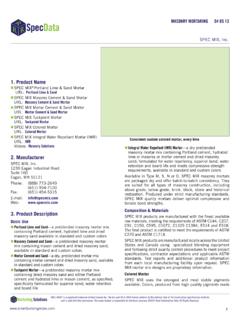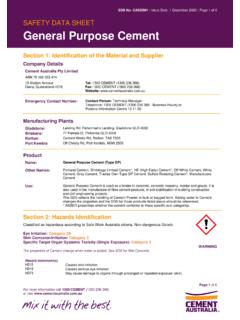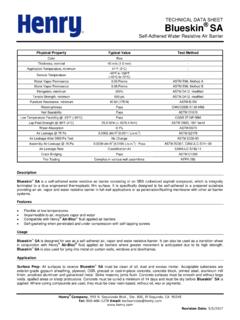Transcription of Safety Data Sheet (SDS) – Masonry Cement Mortars
1 Page 1 of 10 Safety data Sheet (SDS) Masonry Cement Mortars SECTION I: PRODUCT IDENTIFICATION SPEC MIX, LLC 1230 Eagan Industrial Rd. Ste 160 Eagan, MN 55121 Emergency Telephone Number INFOTRAC (800) 535-5053 Information Telephone Number (888) 773-2649 Revised: May-18 SDS SM2 Spec Mix Product Name Item #(s) a. Masonry Cement & Sand Mortar (MC-01) b. Masonry Cement & Sand Mortar Type M (MC-02) c. Masonry Cement & Sand Mortar Type S (MC-03) d. Masonry Cement & Sand Mortar Type N (MC-04) e. Masonry Cement & Sand Mortar Color (MC-05) f. Integral Water Repellent Mortar (IWR) Type M (IW-01) g. Integral Water Repellent Mortar (IWR) Type S (IW-01) h. Integral Water Repellent Mortar (IWR) Type N (IW-01) i. Integral Water Repellent Mortar (IWR) Color (IW-05) j. Set Accelerated Mortar Type M (SA-01) k. Set Accelerated Mortar Type S (SA-01) l. Set Accelerated Mortar Type N (SA-01) m.
2 Set Accelerated Mortar Color (SA-05) n. Set Delayed Mortar Type M (SD-01) o. Set Delayed Mortar Type S (SD-01) p. Set Delayed Mortar Type N (SD-01) q. Set Delayed Mortar Color (SD-05) Product Use: Mortars for construction with block, brick, veneer stones, etc. SECTION II - HAZARD IDENTIFICATION Hazard-determining components of labeling: Silica, Portland Cement Classification of the substance or mixture Carcinogen Category 1A Skin Corrosion Category 1B Skin Sensitization Category 1B Page 2 of 10 Specific Target Organ Toxicity Repeat Exposure Category 1 Specific Target Organ Toxicity: Single Exposure Category 3 Signal word DANGER! Hazard Statements May cause cancer through chronic inhalation Causes severe skin burns and serious eye damage May cause an allergic skin reaction Causes damage to lungs through prolonged or repeated inhalation May cause respiratory irritation Harmful if swallowed Pictograms Precautionary statements Do not handle until all Safety precautions have been read and understood.
3 Wear impervious gloves, such as nitrile. Wear eye protection and protective clothing. Do not eat, drink or smoke when using this product. Wash thoroughly after handling. Use in a well-ventilated area. Wear a NIOSH approved respirator (mask) such as N95 in poorly ventilated areas, when used for extended times, when use is frequent, or when permissible exposure limits may be exceeded. Do not breathe dust. If swallowed: Rinse mouth. Do NOT induce vomiting. If inhaled: Remove person to fresh air and keep comfortable for breathing. If in eyes: Rinse cautiously with water for several minutes. Remove contact lenses, if present and easy to do. Continue rinsing. If on skin (or hair): Remove immediately all contaminated clothing and wash before re-use. Rinse skin or hair with water. If significant skin irritation or rash occurs: get medical advice or attention. Immediately seek medical advice or attention if symptoms are significant or persist.
4 Store in a well-ventilated place. Keep container tightly closed. Dispose of contents/containers in accordance with all regulations. Page 3 of 10 The Portland Cement in this product can cause serious, potentially irreversible damage to skin, eye, respiratory and digestive tracts due to chemical (caustic) burns, including third degree burns. Burns from Portland Cement may not cause immediate pain or discomfort. You cannot rely on pain to alert you to Cement burns. Portland Cement can cause dermatitis or sensitization. Therefore precautions must be taken to prevent all contact with Portland Cement . Cement burns can become worse even after contact has ended. If there is contact with this product, immediately remove all product from body and thoroughly rinse with water. If you experience or suspect a Cement burn or inflammation you should immediately see a health care professional. Skin burns and irritation may be caused by brief exposure, though often are caused by extended exposure of 15 minutes, an hour, or longer.
5 Interaction of Portland Cement with water or sweat releases a caustic solution which produces the burns or irritation. Any extended exposure should be treated as though a burn has occurred until determined otherwise. Skin contact with Portland Cement can also cause inflammation of the skin, referred to as dermatitis. Signs and symptoms of dermatitis can include itching, redness, swelling, blisters, scaling, and other changes in the normal condition of the skin. Signs and symptoms of burns include the above and whitening, yellowing, blackening, peeling or cracking of skin. The Portland Cement in this product may cause allergic contact dermatitis in sensitized individuals. This overreaction of the immune system can lead to severe inflammation. Sensitization may result from a single exposure to the low levels of Cr (VI) in Portland Cement or repeated exposures over months or years. Sensitization is long lasting and, after sensitization, even very small quantities can trigger the dermatitis.
6 Sensitization is uncommon. Individuals who experience skin problems, including seemingly minor ones, are advised to seek medical attention. HNOC Hazards not otherwise classified: Not applicable Unknown Acute Toxicity: None SECTION III - HAZARDOUS INGREDIENTS/IDENTITY INFORMATION Hazardous Components CAS No. % by Weight Sand, Silica, Quartz 14808-60-7 40-70* Portland Cement 65997 15 1 10-30* Lime 01305-62-0 5-10% Pulverized Limestone 01317-65-3 5-10% *The concentrations ranges are provided due to batch-to-batch variability. None of the constituents of this material are of unknown toxicity. Page 4 of 10 SECTION IV FIRST AID MEASURES Description of the first-aid measures General information: After inhalation: Remove person to fresh air. If breathing is difficult, administer oxygen. If not breathing, give artificial respiration. In case of unconsciousness, place patient stably in side position for transportation.
7 After skin contact: Wash skin with cool water and pH-neutral soap or a mild detergent. If significant skin irritation or rash occurs: get medical advice or attention. After eye contact: Rinse cautiously with water for several minutes. Remove contact lenses, if present and easy to do. Continue rinsing. After swallowing: Do not induce vomiting. If conscious, have the victim drink plenty of water and call a physician immediately. Never give anything by mouth to an unconscious person. Most important symptoms/effects, acute and delayed Inhalation: May cause respiratory tract irritation. Causes damage to organs through prolonged or repeated inhalation. This product contains crystalline silica. Prolonged or repeated inhalation of respirable silica from this product can cause silicosis. Skin contact: Skin burns and irritation may be caused from brief exposure, though often are caused by extended exposure of 15 minutes, an hour, or longer. Eye Contact: Causes serious eye damage.
8 Symptoms may include discomfort or pain, excess blinking and tear production, with marked redness and swelling of the conjunctiva. Ingestion: May be harmful if swallowed. Ingestion may cause discomfort and/or distress, nausea or vomiting. Indication of immediate medical attention and special treatment needed: Immediately seek medical advice or attention if symptoms are significant or persist. SECTION V - FIRE FIGHTING MEASURES Flammability of the Product: Non-flammable and non-combustible Suitable extinguishing agents: Treat for surrounding material Special hazards arising from the substance or mixture: None Products of Combustion: None Explosion Hazards in Presence of Various Substances: Non-explosive in presence of shocks Page 5 of 10 SECTION VI ACCIDENTAL RELEASE MEASURES Personal precautions, protective equipment and emergency procedures: Wear personal protective equipment (See section VIII). Keep unprotected persons away.
9 Methods and material for containment and cleaning up: Do not allow to enter sewers/ surface or ground water. Dispose of unwanted materials and containers properly in accordance with all regulations. SECTION VII - PRECAUTIONS FOR SAFE HANDLING AND STORAGE Handling Precautions for safe handling: Ensure good ventilation/exhaustion at the workplace. DO NOT BREATHE DUST. In dusty environments, the use of an OSHA, MSHA or NIOSH approved respirator and tight fitting goggles is recommended. Wear appropriate PPE (See section 8). Do not mix with other chemical products, except as indicated by the manufacturer. Do not get in eyes, on skin or clothing. Good housekeeping is important to prevent accumulation of dust. Storage Requirements to be met by storerooms and receptacles: No special requirements. Information about storage in one common storage facility: Not required. Further information about storage conditions: Keep out of the reach of children.
10 Keep container tightly closed and prevent exposure to humidity. Do not allow water to contact the product until time of use to preserve product utility. SECTION VIII EXPOSURE CONTROL MEASURES / PERSONAL PROTECTION Components with limit values that require monitoring at the workplace: Hazardous Components CAS No. PEL (OSHA) TLV (ACGIH) mg/M3 mg/M3 Silica Sand, crystalline 14808-60-7 (resp) Portland Cement 65997-15-1 5 (resp) 15 (total) 10 (resp) Lime 01305-62-0 5 5 Pulverized Limestone 01317-65-3 5 (resp) 15 (total) 10 (resp) Exposure Controls Use ventilation adequate to keep exposures below recommended exposure limits. General protective and hygienic measures Keep away from foodstuffs, beverages and feed. Immediately remove all soiled and contaminated clothing. Wash hands before breaks and at the end of work. Avoid contact with the eyes and skin. Page 6 of 10 Personal protective equipment Protection of hands: Wear gloves of adequate length to offer appropriate skin protection from splashes.









